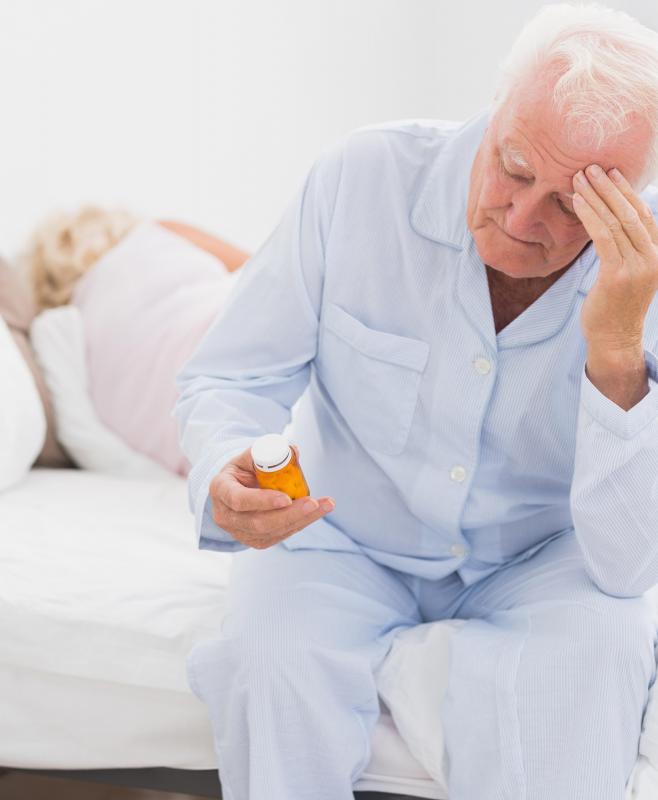At WiseGEEK, we're committed to delivering accurate, trustworthy information. Our expert-authored content is rigorously fact-checked and sourced from credible authorities. Discover how we uphold the highest standards in providing you with reliable knowledge.
Why do I Have to Keep Taking Antibiotics After I Feel Better?
Many patients are familiar with a prescription to take antibiotics which seems to go on forever. It can be very tempting to stop taking antibiotics before the course is completed, especially when patients start to feel better. However, medical professionals strongly recommend that patients keep taking antibiotics until the course is completed, for a number of reasons. Patients should take this recommendation seriously, as failure to keep taking antibiotics can lead to drug resistance, a growing public health problem.
Before explaining why you should continue taking antibiotics, it helps to think about how antibiotics work. Antibiotics are prescribed to fight disease-causing organisms which have invaded your body. There are a number of different types and classes of antibiotics, all of which have varying effects on these bacteria. Penicillin is one of the most well known antibiotics, since it revolutionized Western medicine by making conditions such as gonorrhea treatable.

When antibiotics first entered the market, they were greeted with immense enthusiasm, since they rapidly and effectively treated a range of conditions. However, doctors started to notice that formerly treatable conditions were suddenly no longer curable through one antibiotic, and that it might take several to treat the condition. This phenomenon is called “antibiotic resistance” or “drug resistance,” and it led to wide demand for more antibiotic drugs.

When you take antibiotics, they may not instantly kill all of the organisms in your body. Additional dosages will take out the rest of the bacteria, if you keep taking antibiotics. If you stop taking antibiotics because you feel better, you have directly contributed to the evolution of the bacteria in your body, by weeding out weaker individuals which were resistant to that antibiotic. As you go about your daily activities, you will unknowingly pass on bacteria which have developed a resistance to antibiotics.

Even if you don't care about spreading drug resistant infections to the rest of the population, you may want to consider your own health. Antibiotics kill plenty of good bacteria along with the bad, leaving your body very vulnerable to infection. If you only knock out some of the bacteria causing the infection, you could experience a serious relapse, and because the bacteria have developed resistance to the original antibiotic, you may need to take a course of another drug. Since most doctors start with readily available and inexpensive antibiotics, in the hopes that they will be effective, the cost of treatment will also go up, as more widely effective antibiotic drugs are also more expensive.

Antibiotic dosages are very closely calculated to ensure that they will knock the infection out of your system. By taking the recommended dose at the same time or times every day, you subject the bacteria to a constant bombardment of deadly drugs. After one or two doses, large numbers of the bacteria may be dead, causing you to feel much better, but the drug course is not over, because not all of the bacteria are gone. If you keep taking antibiotics, you eliminate individuals who may have some natural resistance, ensuring that they will not duplicate and spread.

One of the leading causes of drug resistance is the failure to complete prescribed antibiotic regimens. This is a major problem with many diseases, including tuberculosis and Staph. In some cases, a doctor may try up to four antibiotics before finding one which works, and in immunocompromised patients, such as very young children or elderly individuals, this drug resistant infection can prove to be fatal. By making the choice to keep taking antibiotics, you are playing a vital role in global health.
The same goes for your pets, as well! Antibiotic resistance in the veterinary field is also a major problem, primarily due to prophylactic dosages given to farm animals. But household pets may add to the problem, too. Owners may claim that medicating their animals is too difficult to time consuming, and they stop a regular drug regimen once the animal appears to be feeling better. Just as in humans, this can lead to drug resistance and costly relapses of the original problem.
AS FEATURED ON:
AS FEATURED ON:















Discussion Comments
just be careful with how much. my brother just died and during the autopsy they discovered his liver had cirrhosis. it was known that he took vinegar every day because of the pain in his gut. the coroner said that he probably had a pain for another reason for a while, took vinegar, which caused damage to the liver, which caused more pain which caused him to take more vinegar. you can see the cycle. he suffered from that pain for ten years. he also took baking soda. it wasn't the cause of his death, but i guess eventually after too much of the liver was destroyed it could have been.
I feel if you consume apple cider vinegar each day, with EVOO on salads or even add to water & drink, it keeps you healthier. Have others found that to be true? Oh and I don't have a spleen & have not had a cold for a long time. I also use on vegs. Today I went to my ENT Dr. he also said to use half & half apple cider vinegar & alcohol for ear drops when (ears) infected. much cheaper than script & no side effects. Evie
Post your comments